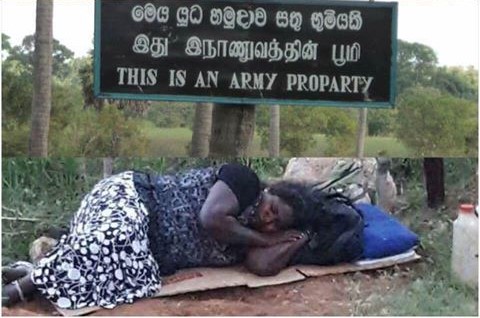Image: Participant mother to in a struggle get their occupied land back take a rest in front of Military warning. (Feb 2017).
Sri Lanka committed with Resolution 30/1 to undertake a comprehensive approach to dealing with the past, including ensuring truth, justice, reparation and non-recurrence for human rights violations and abuses. This is an important step towards acknowledging the traumatic experiences of many thousands of victims over decades of armed conflict and insurgency, and accepting its obligations to provide them with effective remedies. Eighteen months later, while some progress has been made, the process has been too slow and non-transparent. Mixed messages from government officials are further eroding the confidence of thousands of families which have suffered deaths and disappearances, material losses and deep physical and psychological harm. Public frustration is evident over the slow pace of progress on these and other official undertakings, such as the concurrent reform of Sri Lanka’s Constitution, anti-corruption efforts and efforts to end police torture.
The number of cases potentially covered by the four mechanisms that the government has committed to establish – an office on missing persons, an office for reparations, a judicial mechanism with a special counsel, and a truth justice, reconciliation and non-recurrence commission – is vast. Former President and head of its Office for National Unity and Reconciliation, Chandrika Bandaranaike Kumaratunga, acknowledged that Sri Lanka had received 65,000 complaints of enforced disappearances since 1994 and it is likely that many thousands more have gone unreported. Other alleged violations and abuses include: arbitrary arrest and detention; sexual violence; extrajudicial executions; intentional attacks on civilians and protected buildings such as hospitals; the obstruction of humanitarian relief and the Liberation Tigers of Tamil Eelam’s conscription, enlistment and use of child soldiers and use of civilians as human shields during the armed conflict that ended in 2009. Torture has been common practice for decades and remains a matter of on-going and serious concern.
When Sri Lanka co-sponsored Resolution 30/1 in October 2015, it welcomed the participation of international investigators, prosecutors and judges. It must not back away from this commitment. International support will enhance the capacity of Sri Lankan institutions to deal with this large workload effectively. It will also help encourage trust and a perception of fairness on the part of victims, many of whom express deep disillusionment regarding the implementation of Sri Lanka’s commitments.
Implementing the Findings of the Consultation Task Force
A key commitment of the Resolution was to “safeguard the credibility of the processes of truth-seeking, justice, reparations and guarantees of non-recurrence by engaging in broad national consultations…”1, In January 2016, the government appointed the Consultation Task Force on Reconciliation Mechanisms (CTF) to carry out island-wide public consultations on the establishment of the new mechanisms.
1 UN Human Rights Council Resolution 30/1(A/HRC/30/L.29), https://documents-dds-ny.un.org/doc/UNDOC/LTD/G15/220/93/PDF/G1522093.pdf?OpenElement
–Amnesty International’s written statement to the 34th session of the UN Human Rights Council
(27 February- 24 March 2017)
